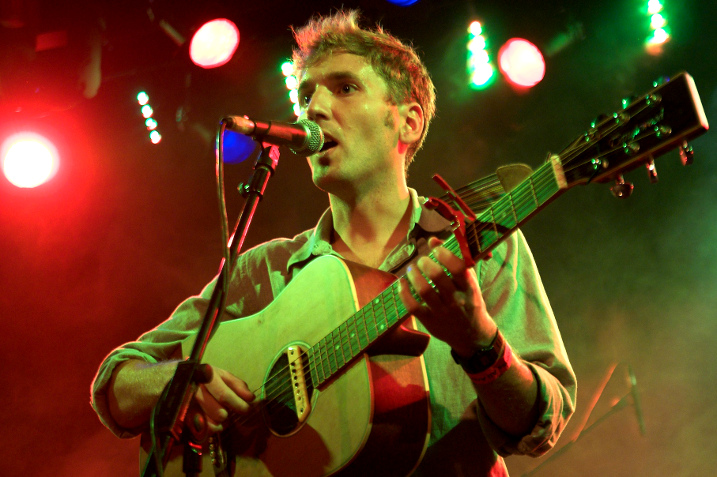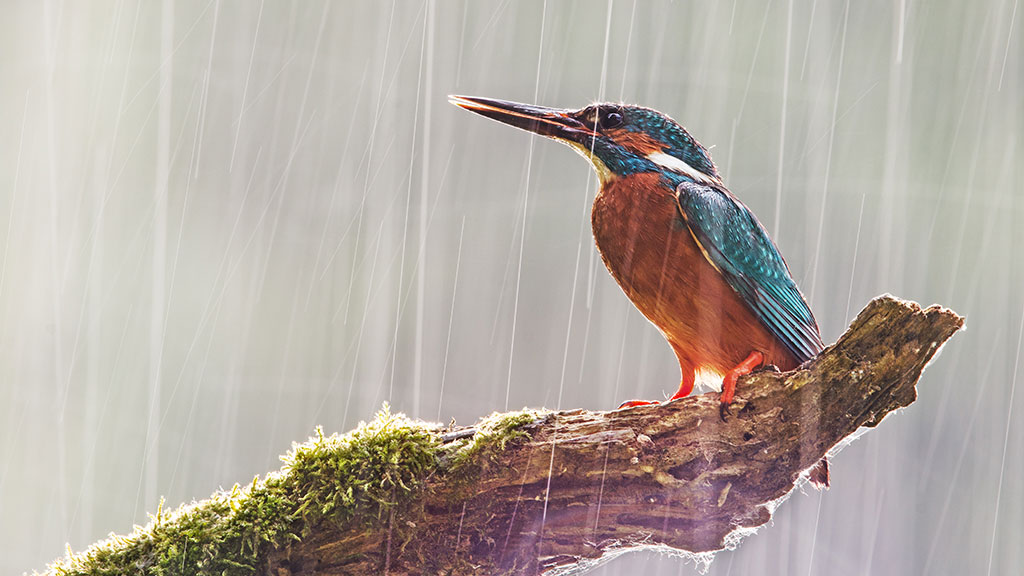From recording albums to recording butterfly numbers, Brian Briggs reveals all
Nature reserves exist not only to provide a safe habitat for wildlife to thrive but also to help connect us to nature and ourselves. Behind the scenes are the people who make these incredible experiences possible. Brian Briggs, who works as a senior reserve warden at the WWT centre in Llanelli, Carmarthenshire, is one of them.
An accomplished musician with successful folk band Stornoway, Brian returned to his other love – conservation – two years ago and took time out from working on the marshes to tell us more about his colourful career.
The nice thing about my job is that every day is different. There isn’t a typical day. I do tend to start with a coffee. Yesterday I ended my day by ringing out my socks after falling into a ditch in a salt marsh. It was comical but fortunately the only witnesses were cows. It does happen every now and then.
Before I started this job, I spent ten years in the music industry playing in a band called Stornoway. We put out three albums and nature was a big part of the inspiration behind the music. Before that I did a PHD on ducks so there’s been some strange career changes there.
We played folky pop music. I was the singer and the song writer. We just finished a farewell tour this spring and then called it a day. We were drifting in different directions. I’m still doing music and I’m working with a poet now so the plan is playing at some festivals this autumn.
We don’t spend much time on the salt marshes but when we do, it’s my favourite place to work. It’s this big, expansive area and you get blasted by Atlantic winds so you get a nice lung fill of salty Atlantic air which I love.
I enjoy doing the butterfly surveys – we only do them in the summer and you have to do it on a nice day because the butterflies don’t come out otherwise. You have to walk really slowly, gently looking for them on the reserve. That has got to be up there with one of the best bits.
I had this dream of getting sheep onto the island on the deep water lake on the nature reserve as we had to do a lot of scrub clearance. The aim was to improve the habitat for a lot of wildlife but particularly lapwings. We had to get the sheep out there one-by-one on a tiny little rowing boat. They didn’t have a clue what was going on thankfully, but they all successfully crossed over and they are now a happy flock grazing out there. It was quite a strange image seeing these sheep standing in a rowing boat.
We had fun putting up an osprey platform recently on the salt marsh in pouring rain and wind. We went out with my group of volunteers and tried to get this osprey platform up. It became a bit surreal and strange because of the wild weather and being up on ladder out in the middle of nowhere. We finished off by eating frangipane cake which has become a bit of a tradition now on the reserve. The volunteers and I have to have frangipanes every Wednesday.
The most important thing I’ve learned from this job is how to pronounce Llanelli. It took me a while. I lived in Oxford for around 15 years before I came here. My wife is Welsh and we’ve always loved Wales. We moved to Wales a few years ago to write an album and then I found my way back into nature conservation.
I’d always kept an interest in nature conservation, having been on that path before the band unexpectedly took off. I had to do an interview for this job just before a sound check in London when we were performing at the Shepherd’s Bush Empire. I had to go to a studio to do a Skype interview with head of reserves so it was pretty strange. I’m very lucky to get back into this line of work.

Music and nature have always been my two main passions. Since leaving university it’s always been a case of one being the job and the other being the hobby. Now it’s switched around again.
I have always loved the coast and sometimes I’ll be out doing fencing or something and think to myself: “This is actually my job.”
I love migration - I love it when birds suddenly arrive overnight. Spring migration is always an exciting time for me.
In terms of what is actually rewarding, there are two things. One is the nature – seeing the differences after lots of practical hard work with volunteers and seeing wildlife show up. Like this year we’ve had lapwings breed for the first time in eight years, after all the work on the islands with all the sheep and things. The other rewarding part is seeing people engaging with nature in some way that I’m helping to look after and people enjoying themselves getting close to nature.
Something that might surprise people is that nature conservation in wetlands and what we do, a lot of it is about cutting down vegetation and cutting down trees and trying to stop vegetation from growing. That’s what much of nature conservation is in wetlands. The reason being is that humans have changed the landscape so much that we no longer have these beasts that would once have roamed around like wild cattle, beavers, elk and wild horses or big seasonal flooding that we now control. That would have all gone on and helped naturally maintain wetlands and now, because those pieces of the jigsaw are not there, we have to do the job of being the beavers and the cattle.
Our job is important because we are doing the job of what would have naturally been done in the past. One thing that is really unique about the Wildfowl and Wetlands Trust (WWT) and that I definitely try my best with as well, is getting people and nature together. My job really is focused mainly on attracting wildlife however we do also put a lot of time into looking after and creating hides in places that allow people to get close to nature. I think that’s really important in terms of the future of wildlife in Britain and elsewhere – people connecting with it.
The thing that worries me is that kind of disconnection that people tend to have these days from nature. So many people live their lives almost completely shielded from it, but without any connection to nature then why should they do anything about trying to protect it? And yet we are a species and we are an animal just like all the others are. It’s too easy for us to forget that what we do has a direct effect on the planet and the web of species that we’re part of.
It’s thanks to our big funders that we can do the exciting projects. The support of players of People’s Postcode Lottery is invaluable. It’s not that it just helps cover the general costs of running a charity, but it helps us turn our big ideas into reality. At Llanelli, players’ support has enabled us to develop a natural play area to help give children that vital connection with nature.
I’m also grateful for the café because I have a terrible sweet tooth and when it comes to cake, I can’t get enough of it. It’s dangerous having a huge selection of cakes available at all times. I’m also grateful to my volunteers even though they eat quite a lot the cake that I bring in.
The volunteers that help me, we couldn’t do half of what we do on the reserve without them and the same applies to all the different departments at the centre as well. They bring a really nice atmosphere with them and a really great spirit, so we have a lot of fun.
Support from players of People’s Postcode Lottery helps Brian, his colleagues and volunteers to provide the best possible conditions for wildlife to flourish at WWT Llanelli and provide the facilities for our visitors to enjoy and learn about wetlands and their wildlife.



